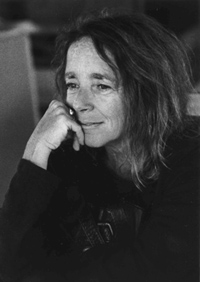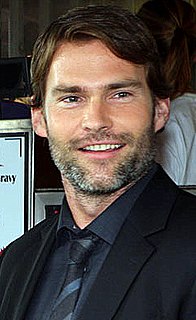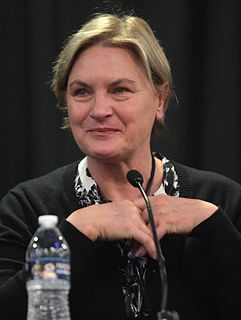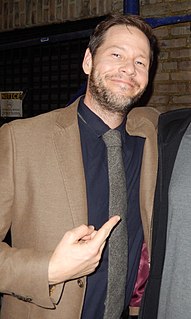A Quote by Ursula Goodenough
Perhaps we should all settle down and think about what's good in the world and what we want to do here. If we find this planet and its history and its story to be sacred, let's preserve and nourish it, and then we can go home at night and say whatever prayers we choose.
Related Quotes
That's why I want to speak to you now. To say: no person, trying to take responsibility for her or his identity, should have to be so alone. There must be those among whom we can sit down and weep, and still be counted as warriors. (I make up this strange, angry packet for you, threaded with love.) I think you thought there was no such place for you, and perhaps there was none then, and perhaps there is none now; but we will have to make it, we who want an end to suffering, who want to change the laws of history, if we are not to give ourselves away.
I would say plotting is the most difficult thing for me. Characterization is only hard because sometimes I feel I get so interested in it that I want to talk too much about the characters and that slows the story down. So I say, "Hey, people want to find out what's going to happen next, they don't want to listen to you spout off about this or that person." But I think even the bad guy deserves to tell his side of the story.
If we think that we can somehow gain control of the US government, bring it under popular, enlightened progressive control, preserve a habitable climate, and rein in the dangers of nuclear and other warfare, then we should. However, if we think it's more likely that California can achieve those goals by secession, then we should go down that path. There's no question. It's an absolute moral imperative.
...you must say words, as long as there are any, until they find me, until they say me, strange pain, strange sin, you must go on, perhaps it's done already, perhaps they have said me already, perhaps they have carried me to the threshold of my story, before the door that opens on my story, that would surprise me, if it opens, it will be I, it will be the silence, where I am, I don't know, I'll never know, in the silence you don't know, you must go on, I can't go on, I'll go on
You sit down at Katz's and you eat the big bowl of pickles and you're eating the pastrami sandwich, and halfway through you say to yourself, I should really wrap this up and save it for tomorrow. But the sandwich is calling you: Remember the taste you just had. So fatty. It's what you want. It's what you are! I've never gotten home from Katz's with a doggie bag in my hand. A pastrami sandwich at Katz's is what's bad and good about food. It's the sacred and the profane.
I saw a huge steam roller, It blotted out the sun. The people all lay down, lay down; They did not try to run. My love and I, we looked amazed Upon the gory mystery. "Lie down, lie down!" the people cried. "The great machine is history!" My love and I, we ran away, The engine did not find us. We ran up to a mountain top, Left history far behind us. Perhaps we should have stayed and died, But somehow we don't think so. We went to see where history'd been, And my, the dead did stink so.
First and foremost, I want people to have a good read, because I want everything I write to entertain people. There are always different layers to the story, though, so if you want to think about social justice, or sexism or racism or homophobia, or really drill down into why the world is a better place when the police force looks like the people they are policing, then that's there, too.
My theory for nonfiction is that nobody can be free of some kind of conceptions about whatever story they're writing. But if you can find a way to build those into the story, then the story becomes a process of deconstructing and heightening and sometimes changing those notions and that makes dramatic tension. The initial statement of your position, and then letting reality act on you to change it, is pretty good storytelling.


































